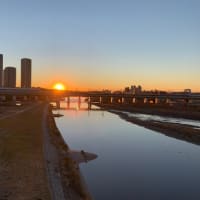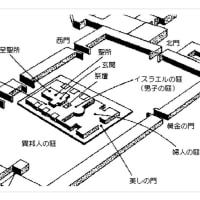49章 四方が確かであっても
1.アモンへの宣告
エジプト、ペリシテ、モアブと、イスラエル周辺諸国に対する裁きのことばが語られてきましたが、49章では、アモン、エドムとさらに神の裁きのことばは拡大していきます。まずアモンですが、アモン人はアブラハムの甥ロトの子孫で、イスラエルとは親族関係にある民族です(創世記19章)。ラバ(現在のヨルダンの首都アンマン)を中心に定住しました。1節「ミルコム」とあります。新改訳第三版は、ヘブル語の本文通り「マルカム」つまり「彼らの王」と訳していました。新改訳2017では、欄外の注釈にあるように、七十人訳に倣って「ミルコム」と修正されました。文脈は、アモン人の民族神、モレクとも呼ばれた偶像礼拝への非難にあると見たためなのでしょう。「アモン人のあの忌むべきミルコム」あるいは「モレク」は、旧約聖書の中に繰り返されるフレーズです。それは、幼児を偶像への生贄として献げる宗教であり、イスラエルにはソロモン時代の政略結婚の慣習と共に入ってきたものです。この忌むべき悪習は、ヨシヤ王の宗教改革時代に一旦排除されましたが、再び復活しています。神はこのような忌まわしい偶像崇拝に熱中するアモン人にさばきを宣告されます。しかし、アモン人を滅ぼそうというのではありません。神の願いは、このような残虐な人身供養を行うような偶像崇拝を捨てて、まことの神に立ち返り、人間として当たり前の感覚と、まことに平和な社会を取り戻すことです。ですから、神は、偶像崇拝を捨てるアモン人の繁栄を回復されると約束されるのです(6節)。
2.エドムへの宣告
次にエドム人。エドム人はアブラハムの孫エサウの子孫で、パレスチナ南東部に定住していました。7節「テマン」はエサウの孫の名ですが、ここでは地名となっています。テマンに住む住民は知恵によって知られ、「岩の住みか、丘の頂き」(16節)と自然の地形に守られて暮らしていました。つまり四方を岩に囲まれ、安全な住処に住んでいると思っていたのです。しかしどんなに四方が守られていても、彼らの滅びは上からやってきたのです。神はエドム人をも徹底して裁かれると語られます。エドムが裁かれる理由は、その高慢さのため、脅かしのためとされます。エドムに対してはアモンのように再生されるというメッセージはありません。
3.そのほかのパレスチナの町々への宣告
23節からはダマスコをはじめ、パレスチナの北部や東部に散在する種々の町々についての裁きのメッセージです。23節、ハマテはパレスチナ北部、ダマスコの北オロンテス河畔の町、アルパデはさらに北に位置する町です。28節のケダルはパレスチナの東の町、シリヤ・アラビヤ砂漠に住んでいる遊牧民、つまりベドゥイン族を指します。同じ28節のハツォルはパレスチナ北部の町。34節のエラムはパレスチナから遠く離れた場所、バビロンの東、ペルシャ湾に面する町です。エレミヤの預言は実に広範囲です。というよりも、神が、全ての国々に、目を配られているということでしょう。
その神があわれみをもって、ユダヤ人、モアブ人(48:47)、アモン人(49:6)、エラム人(49:39)に回復と元の繁栄を約束されています。しかし、実際に、バビロンに滅ぼされてその恵みに与ったのはイスラエルのみです。なぜか。種々の理由があるでしょうが、やはり神のことばを信仰をもって受け止め、その回復を待ち望んだイスラエルと他の国々との違いがそこにあったのではないでしょうか?堅固な四方に守られても滅びが上から来るように、四方八方窮したとしても救いも上から来る。たとえ倒されても神のことばを信頼し、再生する機会を待つ者を、神は約束どおりに、立たせてくださると言うべきでしょう。では今日も良き一日となるように祈ります。
<クイズコーナー>
最初に、昨日のクイズです。モアブ人の神、ケモシュをイスラエルに導入した人物は誰でしょうか?①ソロモン、②アハブ、③ヨシヤ。答えは①ソロモンでした。ケモシュ礼拝は、ヨシヤの宗教改革の時まで続きました(2列王23:13)。では、今日の聖書クイズです。エラムの首都は、次のどれでしょうか?①スサ、②ニネベ、③ツロ、答えはまた明日。では今日も良き一日であるように祈ります。
Chapter 49 - Even if all sides are certain
1. the sentence against Ammon
In chapter 49, God's words of judgment are further expanded to Ammon and Edom. The Ammonites, descendants of Abraham's nephew Lot, are a people related to Israel (Genesis 19). They settled mainly in Rabbah (present-day Amman, the capital of Jordan), verse 1, "Milcom." The New Revised Version 3 translated "Malqam" or "their king" as in the Hebrew text. The New Revised 2017 corrected it to "Milcom" following the translation of the Seventy, as indicated in the note outside the column. This may be because the context was seen as a condemnation of the idolatry of the Ammonites, who were also called Molech, the national god of the Ammonites. The phrase "that abominable Milcom of the Ammonites" or "Molech" is a recurring phrase in the Old Testament. It is the religion of offering infants as sacrifices to idols, which came to Israel along with the practice of political marriage in Solomon's time. This abominable practice was once eliminated during the Reformation period of King Josiah, but has been revived again. God pronounces judgment on the Ammonites for their infatuation with this abominable idolatry. But God does not intend to destroy the Ammonites. God's desire is to abandon the idolatry that leads to such cruel human offerings, and to turn back to the true God and restore a sense of what is natural for human beings and a truly peaceful society. Thus, God promises to restore the prosperity of the Ammonites who abandon idolatry (v. 6).
2. pronouncement to the Edomites
Next, the Edomites. The Edomites were descendants of Esau, grandson of Abraham, and settled in southeastern Palestine. v. 7 "Teman" is the name of Esau's grandson, but here it is a place name. The inhabitants of Teman were known by their wisdom and lived protected by the natural terrain, "the dwelling place of the rock and the top of the hill" (v. 16). In other words, they thought they were living in a safe dwelling place, surrounded on all sides by rocks. But no matter how protected they were on all sides, their destruction came from above. We are told that God will thoroughly judge the Edomites as well. Edom will be judged because of their pride and because of their threats. There is no message that Edom will be regenerated like Ammon.
3. the sentence against the other Palestinian cities
From verse 23, the message of judgment is directed to Damascus and various other towns scattered in the northern and eastern parts of Palestine, including Hamath, a town on the Orontes River north of Damascus in northern Palestine, and Alpadeh, a town further north. and refers to the nomads, or Beduin, who live in the eastern town of Palestine. Hatzol in verse 28 is a town in northern Palestine, and Elam in verse 34 is a town far from Palestine, east of Babylon, on the Persian Gulf. Jeremiah's prophecy is indeed far-reaching. Rather, it is a sign that God is looking out for all nations.
In his mercy, God promises restoration and restored prosperity to the Jews, Moabites (48:47), Ammonites (49:6), and Elamites (49:39). However, in fact, it is only Israel that was destroyed by Babylon and received its blessings. Why? There may be various reasons, but I think the difference between Israel and the other nations was that Israel accepted the Word of God with faith and longed for its restoration. Just as destruction comes from above even if you are protected on all sides, salvation also comes from above even if you are in trouble on all sides. I should say that God will let stand, as He promised, those who trust in His Word and wait for the opportunity to be regenerated, even if they are knocked down. I wish you a good day today.
<Quiz Corner
First, yesterday's quiz. Who introduced Chemosh, the god of the Moabites, to Israel? (1) Solomon, (2) Ahab, and (3) Josiah. The answer was (1) Solomon. Chemosh worship continued until the time of Josiah's Reformation (2 Kings 23:13). Now for today's Bible quiz. Which of the following was the capital of Elam? (1) Susa, (2) Nineveh, (3) Turo, and the answer will be given tomorrow. Well, I wish you a good day today.
















